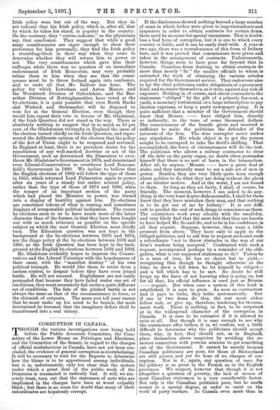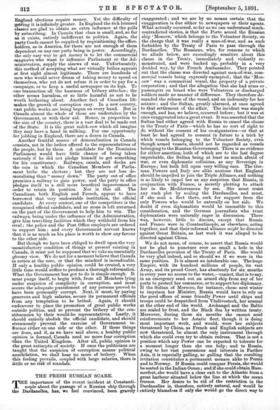CORRUPTION IN CANADA.
THOUGH the various investigations now being held before the Public Accounts Committee, the Com- mittee of the Lower House on Privileges and Elections, and the Committee of the Senate, in regard to the charges of official misbehaviour in Canada, have not yet been con- cluded, the evidence of general corruption is overwhelming. It will be necessary to wait for the Reports to determine how the blame is to be apportioned among individuals, but it is, unfortunately, only too clear that the system under which a great deal of the public work of the Dominion is transacted is radically bad. It will, we sin- cerely trust, turn out that the statesmen of note who are implicated in the charges have been at worst culpably blind ; but there is no room for doubt that many of their subordinates are hopelessly corrupt. If the disclosures showed nothing beyond a large number of cases in which bribes were given to superintendents and inspectors in order to obtain contracts for certain firms,. there need be no cause for special uneasiness. That is doubt-. less a bad form of corruption, but it is one to which every country is liable, and it can be easily dealt with. A year or two ago, there was a recrudescence of this form of bribery here, and it was proved that commissions were given and taken in the arrangement of contracts. Unfortunately, however, things seem to have gone far beyond that in Canada. Canadian firms desiring to obtain contracts do more than merely " fix " the smaller officials to whom is. entrusted the work of obtaining the various articles. required for the Government service. They endeavour also to lay the chief politicians under obligations of a pecuniary kind, and so insure themselves, as it were, against any risk of exposure. Nothing is, of course, said about contracts to the statesman " obliged " by the gift of a princely fur-coat, a yacht, a monetary testimonial, or a large subscription to pay election expenses, or keep a party newspaper going. It is quite sufficient that a member of the Government should know that Messrs. — have obliged him, directly or indirectly, to the tune of some thousand dollars. The consciousness of the benefit given and received is . sufficient to make the politician the defender of the interests of the firm. The wise corrupter never makes any stipulation. His whole object is to get the person sought to be corrupted to take the devil's shilling. That accomplished, the force of circumstances will do the rest. The politician who allows a railway contractor to clear off the debt on the party organ, no doubt often persuades himself that there is no sort of harm in the transaction. After all, he argues, ' Messrs. — have a great deal at stake, and they naturally want to see a safe set of men in power. Besides, they are very likely quite keen enough about politics to do what they are doing without the ghost of an ulterior motive. And at the worst, I am not bound to them. As long as they act fairly, I shall, of course, be friendly. The moment, however, I am asked to do any- thing in the very least degree dishonourable, I shall let them know that they have mistaken their man, and that nothing is to be got out of me by bribery.' It is not diffi- cult to predict the end of such drugs to conscience as these. The contractors work away silently with the small-fry, and very likely find that the mere fact that they are known to have helped Mr. So-and-So, and to be in his confidence, is all they require. Suppose, however, they want a little' pressure from above. They have only to apply to the obliged politician, and to ask him to request such-and-such a subordinate " not to throw obstacles in the way of our firm's tenders being accepted." Confronted with such a request, accompanied perhaps by a reminder of the obli, gation, what is our supposed statesman to do ? Unless he is a man of iron, he has no choice but to yield,— recognising that though he thought otherwise at the time, he drew a bill when he let himself be obliged— and a bill which has to be met. No doubt he still keeps up the farce of not knowing what is going on, but for all that, his official influence is used just as Messrs. require. But when once a system of this kind is established, it is sure to grow. As soon as contractors find it pays to bribe, they bribe systematically.. But if one or two firms do this, the rest must either follow suit, or give up, therefore, tendering for Govern- ment work. There is nothing, in fact, to be surprised at in the widespread character of the corruption in Canada. It is sure to be extensive if it is allowed to exist at all. But though it is easy enough to see why the contractors offer bribes, it is, we confess, not a little difficult to determine why the politicians should accept. them, why, in fact, they should not, as in England,. place themselves above suspicion by avoiding the re- motest connection with persons anxious to get something out of the Government. It cannot be merely because Canadian politicians are poor, for those of Switzerland are still poorer, and yet we hear of no charges of cor ruption. Nor is it, again, any question of race, for the jobbery is as great in the French as in the English' provinces. We suspect, however that though it is not altogether a question of poverty, the lack of means of most Canadian statesmen is a very considerable factor. Not only is the Canadian politician poor, but he needs money in a special degree, in order to carry on the work of party warfare. In Canada even more than in England elections require money. Yet the difficulty of getting it is infinitely greater. In England the rich leisured classes are glad to obtain an extra influence at the polls by subscribing. In Canada that class is small, and, so far as it exists, entirely indifferent to politics. Again, the party funds cannot be supplied by requisitioning the office- holders, as in America, for there are not enough of them dependent on any one party being in power. Accordingly, the only easy way to get money is to let the commercial magnates who want to influence Parliament or the Ad- ministration, supply the sinews of war. Unfortunately, this method of accepting what are virtually bribes appears at first sight almost legitimate. There are hundreds of men who would never dream of taking money to spend on themselves, who yet do not refuse it in order to pay for a campaign, or to keep a useful newspaper on its legs. To one transaction all the baseness of bribery attaches ; the -other seems harmless, or so little harmful as not to be worth bothering about. Another fact of Canadian life makes the growth of corruption easy. Ina new country, 'vast public works are being begun on every hand. But in 'Canada almost the whole of these are undertaken by the Government, or with their aid. Hence, in proportion to the size of the country, there is a vast deal to be made out -of the State. It is the great milch-cow which all imagine they may have a hand in milking. For one opportunity ler jobbing in England, there are a dozen in Canada. Another fruitful source of demoralisation in Canada consists, not in the bribes offered to the representatives of the people, but by them. A candidate for the Dominion Parliament would have little chance of being taken seriously if he did not pledge himself to get something for his constituency. Railways, canals, and docks are the coin in which the Canadian Members of Parlia- ment bribe the electors ; but they are not less de- moralising than " money down." The party out of office promises a railway to gain power, and the party in office pledges itself to a still more beneficial improvement in order to retain its position. Nor is this all. The Canadians, both English and French, appear to have borrowed that very undesirable institution, the official .candidate. At every contest, one of the competitors is the recognised official candidate, and no stone is left unturned -on the part of the Government to help him to win. The railways, being under the influence of the Administration, give him travelling facilities which they withhold from his rival ; the police and the Post Office employes are ordered to support him ; and every Government servant knows that it is as much as his place is worth to show any favour to the other side.
But though we have been obliged to dwell upon the very 'unsatisfactory condition of things at present existing in Canada, it must not be supposed that we take an essentially .gloomy view. We do not for a moment believe that Canada is rotten at the core, or that the mischief is ineradicable. If only a healthy public opinion could be created, a very :little time would suffice to produce a thorough reformation. What the Government has got to do is simple enough. It must purge itself, to begin with, from all Members lying under suspicion of complicity in corruption, and must secure the adequate punishment of any persons proved to have been personally corrupt. Next, it must, by paying generous and high salaries, secure its permanent officials from any temptation to be bribed. Again, it should endeavour to place the promotion of great public works -outside politics, and so prevent the bribery of the con- stituencies by their would-be representatives. Lastly, it should entirely abolish the official candidate, and should -strenuously • prevent the exercise of Government in- Inence either on one side or the other. If these things .are done, and if, as we have said above, a healthy public opinion is formed, Canada need no more fear corruption than the United Kingdom. After all, public opinion is -the great antiseptic of society. If once the politicians are taught that the suspicion of corruption means political annihilation, we shall hear no more of bribery. When this feeling prevails, coupled with large salaries, there is little or no risk of scandals. •



































 Previous page
Previous page